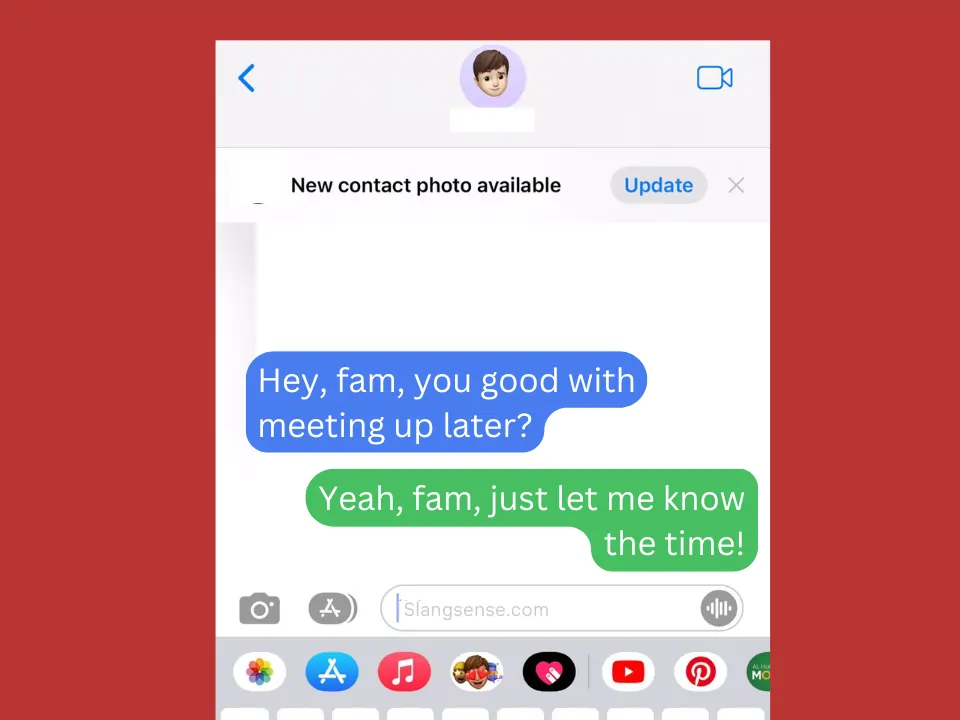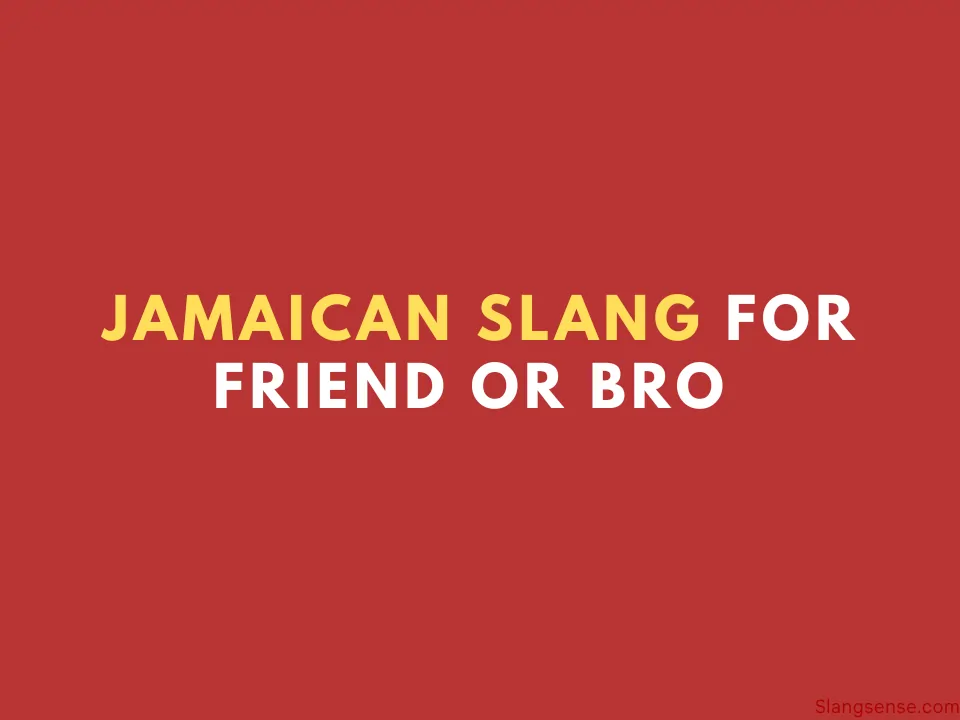Ever wondered what Jamaican slang for "friend" or "bro" really means? Well, buckle up, because we're about to dive deep into the vibrant world of Jamaican patois and uncover some of the coolest terms used by the islanders to describe their buddies. This isn't just about words—it's about understanding the culture, the vibes, and the heart of Jamaica. So, let's get started, mon!
Jamaican slang, also known as patois, is more than just a dialect. It's a reflection of the island's rich history, blending African roots with English influences. When you hear someone say "bredrin" or "my bredrums," you're tapping into a language that carries stories, struggles, and celebrations. But what exactly do these words mean, and why are they so significant? That's what we're here to find out.
In this article, we'll explore the most common Jamaican slang terms for "friend" and "bro," their origins, and how they're used in everyday conversations. We'll also touch on the cultural significance of these words and why they resonate so deeply with Jamaicans and fans of reggae music worldwide. So, whether you're planning a trip to Jamaica or just curious about its unique language, this is the ultimate guide for you.
- Does Jerry Cantrell Have A Son Family Life Biography
- The Beatles Whos Still Alive Their Enduring Legacy
Da Table of Content
Introduction: The Roots of Jamaican Slang
Common Jamaican Slang for Friend or Bro
The Cultural Significance of Jamaican Patois
- Stephanie Mcmahon Nude Pics Videos What Fans Want
- Trey Yingst Nationality Bio More Everything You Need To Know
Where Did These Words Come From?
How Jamaicans Use Slang in Daily Life
The Role of Music in Spreading Jamaican Slang
Tourism and the Spread of Jamaican Vernacular
Tips for Learning Jamaican Slang
Final Thoughts: Embrace the Vibe
The Roots of Jamaican Slang
Jamaican slang, or patois, has a fascinating history that dates back to the island's colonization. It's a mix of West African languages, English, Spanish, and even some Portuguese influences. The result? A rich, melodic language that's as unique as the island itself. When it comes to terms for "friend" or "bro," you'll find that they often carry deeper meanings than just a casual greeting.
For instance, "bredrin" isn't just a word—it's a term of endearment that signifies a bond between brothers, whether biological or spiritual. Similarly, "my fiends" or "mi fiends" is a casual way of saying "my friends," but it also implies a sense of loyalty and camaraderie. These words aren't just thrown around; they're a reflection of the close-knit communities that make up Jamaican society.
Common Jamaican Slang for Friend or Bro
Now, let's break down some of the most popular Jamaican slang terms for "friend" or "bro." Here's a quick list to get you started:
- Bredrin – Brother or close friend
- Fiend – Friend
- Gwaan – Go on, as in "what's up?"
- Babylon – Oppressors or authority figures
- Irie – Cool or chill
These words might seem simple, but they carry a lot of weight in Jamaican culture. For example, when someone says "bredrin," they're not just referring to a buddy—they're acknowledging a shared struggle, a common goal, or a deep connection. It's a term that embodies the spirit of unity and resilience that defines Jamaica.
The Cultural Significance of Jamaican Patois
Jamaican patois isn't just a language; it's a cultural identity. It's the voice of reggae legends like Bob Marley and Buju Banton, the rhythm of dancehall beats, and the heartbeat of the island. When you learn Jamaican slang, you're not just picking up words—you're immersing yourself in a world of music, art, and tradition.
In many ways, patois serves as a form of resistance against colonial influences. By preserving their unique dialect, Jamaicans have maintained their cultural heritage and kept their stories alive. Terms like "bredrin" and "fiend" are part of this legacy, reminding us of the importance of community and solidarity.
Where Did These Words Come From?
The origins of Jamaican slang can be traced back to the island's history of slavery and colonization. During the 17th and 18th centuries, enslaved Africans brought their languages and traditions to Jamaica, blending them with the English spoken by their oppressors. Over time, this fusion evolved into what we now know as patois.
Words like "bredrin" come from the African concept of brotherhood, while "fiend" is a corruption of the English word "friend." These linguistic adaptations reflect the resilience and creativity of the Jamaican people, who have always found ways to adapt and thrive in the face of adversity.
How Jamaicans Use Slang in Daily Life
In everyday conversations, Jamaican slang is used to express everything from greetings to emotions. For example, you might hear someone say "Wha gwaan, bredrin?" which translates to "What's up, bro?" or "Mi no know, mi fiends," meaning "I don't know, my friends." These phrases are casual yet meaningful, often carrying a sense of humor or warmth.
It's important to note that Jamaican slang isn't just for casual chats. It's also used in formal settings, such as political speeches or religious sermons. This versatility is one of the reasons why patois continues to thrive in modern Jamaica, even as English remains the official language of the island.
The Role of Music in Spreading Jamaican Slang
Music has played a crucial role in popularizing Jamaican slang around the world. Reggae and dancehall artists like Bob Marley, Damian Marley, and Sean Paul have introduced millions of listeners to terms like "bredrin" and "fiend" through their songs. In fact, many people outside of Jamaica first encounter patois through music, which has helped to preserve and celebrate the language.
For example, Bob Marley's iconic song "No Woman, No Cry" features the line "Every little thing gonna be all right," which is a direct translation of the Jamaican phrase "Irie." Similarly, Sean Paul's hit "Get Busy" uses the term "gwaan" to ask listeners what's going on in their lives. These songs not only entertain but also educate, giving listeners a glimpse into the world of Jamaican slang.
Tourism and the Spread of Jamaican Vernacular
As tourism continues to grow in Jamaica, more and more visitors are learning about the island's unique language and culture. Many resorts and tour operators now offer classes in Jamaican patois, allowing travelers to connect with locals on a deeper level. This exchange benefits both tourists and Jamaicans, fostering mutual understanding and respect.
However, it's important to approach Jamaican slang with sensitivity and respect. While it's great to learn new words and phrases, it's equally important to understand their cultural context and significance. Avoid using patois inappropriately or out of context, as this can come across as disrespectful or even offensive.
Tips for Learning Jamaican Slang
If you're eager to learn Jamaican slang, here are a few tips to get you started:
- Start with the basics: Begin by learning common terms like "bredrin," "fiend," and "gwaan."
- Listen to music: Reggae and dancehall songs are a great way to hear patois in action.
- Practice with locals: If you have Jamaican friends or acquaintances, ask them to teach you a few phrases.
- Be patient: Like any language, patois takes time to master, so don't get discouraged if you don't pick it up right away.
Remember, the goal isn't just to learn the words but to understand the culture behind them. By doing so, you'll gain a deeper appreciation for the beauty and complexity of Jamaican patois.
Common Mistakes to Avoid
When learning Jamaican slang, it's easy to make mistakes, especially if you're unfamiliar with the language. Here are a few common errors to watch out for:
- Overusing slang: While it's great to incorporate patois into your conversations, don't overdo it. Too much slang can come across as forced or unnatural.
- Mispronouncing words: Jamaican patois has its own unique rhythm and intonation, so pay attention to how locals pronounce words.
- Using offensive terms: Some Jamaican slang words have negative connotations, so be sure to research their meanings before using them.
By avoiding these mistakes, you'll show respect for the language and its speakers, which is essential when learning any new dialect.
Final Thoughts: Embrace the Vibe
Jamaican slang for "friend" or "bro" is more than just a collection of words—it's a reflection of the island's vibrant culture and rich history. Whether you're learning patois for fun or out of curiosity, remember that the key to mastering any language is understanding its context and significance.
So, the next time you hear someone say "bredrin" or "fiend," take a moment to appreciate the depth and meaning behind those words. And if you're ever in Jamaica, don't hesitate to strike up a conversation with the locals. Who knows? You might just make a new bredrin of your own!
Now, it's your turn. Share your thoughts in the comments below, and don't forget to check out our other articles on Jamaican culture and language. Together, let's keep the spirit of Jamaica alive and thriving!



Detail Author:
- Name : Bryce Hahn
- Username : vherzog
- Email : hferry@hotmail.com
- Birthdate : 1981-03-10
- Address : 2406 Molly Centers Apt. 993 Lake Hobart, UT 30242
- Phone : 680-402-4218
- Company : Robel Group
- Job : Entertainment Attendant
- Bio : Aliquam voluptas minus nostrum quia nisi pariatur id. Expedita ipsum voluptatum accusantium est. Voluptatum dolorem recusandae illum nisi totam voluptatibus. Maiores atque et consequatur sed.
Socials
tiktok:
- url : https://tiktok.com/@retta5824
- username : retta5824
- bio : Tempora consequatur facere odio alias eveniet dolor adipisci voluptas.
- followers : 5861
- following : 793
twitter:
- url : https://twitter.com/retta.bruen
- username : retta.bruen
- bio : Et animi aut voluptates aut cum architecto. Autem sed qui aut inventore harum.
- followers : 3313
- following : 179